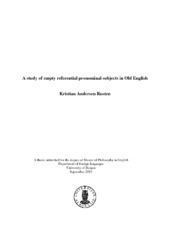A study of empty referential pronominal subjects in old english
Master thesis
Permanent lenke
https://hdl.handle.net/1956/5006Utgivelsesdato
2010-09-01Metadata
Vis full innførselSamlinger
Sammendrag
This master thesis is concerned with empty referential pronominal subjects in Old English prose. The study has investigated 450 occurrences of subjectless" sentences taken from a corpus consisting of eleven Old English prose texts. The aim of the investigation has been to describe the non-expression of referential subject pronouns, and attempt to determine whether any systematicity can be seen with regards to its syntactic properties. Certain pragmatic factors have also been considered. The study has been explorative in focus. Given that previous studies to a great extent have been based on very restricted data, it has been attempted to quantify the phenomenon to as high a degree as possible. The quantitative analysis is based on various structural variables proposed by previous scholarship. In so doing, several claims regarding the extent of this phenomenon in Old English have been tested, and it has also been investigated whether the syntactic environments in which the empty pronouns occur influence the permissibility of the phenomenon. The study is structured in the following manner: chapter 1 presents the background for the project, in addition to the research questions forming the basis for the study. Chapter 2 presents previous studies in the area. This includes a presentation of relevant generative research into the so-called pro-drop parameter, in addition to research on empty pronouns in Old English specifically, and also in other early Germanic languages. Chapter 3 details the method employed in connection with data collection and analysis. Certain problems of analysis are discussed here, as well. Chapter 4 comprises the main part of the study, where the data material is presented and discussed. Chapter 5 summarises the preceding chapters and offers a conclusion based on the research questions posed in Chapter 1. The study concludes that empty subjects in Old English represent a much more limited phenomenon than suggested in previous research. Indeed, the occurrences are few enough that the phenomenon must be said to be more or less dead" in Old English. It is seen, however, that empty subjects are significantly more frequent in the early Old English period compared to the late Old English period. In terms of syntactic environment, it is seen that empty subjects primarily occur in second conjunct clauses. It is also seen that the majority of the instances of empty subjects are co-referent with a subject occurring in the preceding context. It is also concluded that it is difficult to detect much systematicity in terms of what permitted" or governed" these empty subjects. Still, it is assumed that the occurrences discussed in this work can be explained by a combination of several factors, where pragmatics no doubt plays a part. It was also suggested that some of the occurrences could represent remnants of an antiquated Germanic grammatical system. Finally, it cannot be excluded that at least some of the instances are the result of grammatical error on part of the author or scribe.
